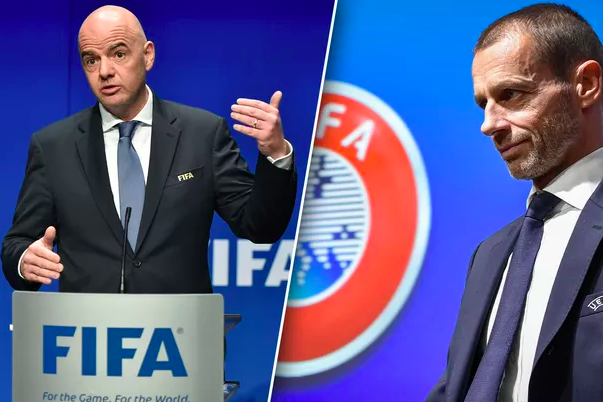
FIFA, UEFA Breached EU Law, Says European Court Of Justice
FIFA and UEFA contravened EU law by preventing the formation of a Super League, the European Court of Justice said on Thursday, in a landmark ruling that could change the way football is run.
The European clubs that proposed forming the breakaway league, which sparked widespread protests among angry fans, had been threatened with sanctions by UEFA if they went ahead with the plan. It led to nine clubs pulling out.
In its ruling, the EU’s top court said that FIFA and UEFA abused their dominant position by forbidding clubs to compete in a European Super League (ESL), although that project may still not be approved as the court did not rule on it specifically.

UEFA has organised pan-European competitions for nearly 70 years and sees the ESL project as a significant threat to the lucrative Champions League, for which teams qualify on merit.
Real Madrid, Barcelona, Juventus and nine other leading European clubs announced the breakaway plan in April, 2021.
But the move collapsed within 48 hours after an outcry from fans, governments and players forced Manchester United, Liverpool, Manchester City, Chelsea, Tottenham Hotspur, Arsenal, AC Milan, Inter Milan and Atletico Madrid to pull out.
Shares in Juventus, listed on the Italian Stock Exchange, rose more than 10% on prospects for a revived ESL, with trading having to be halted because of excessive volatility.
Sports development company A22, which was formed to assist with creating the ESL, had claimed UEFA and global football governing body FIFA held a monopoly position, which was in breach of the European Union’s Competition and Free Movement Law.

“We have won the right to compete. The UEFA-monopoly is over. Football is free,” said A22 CEO Bernd Reichart.
“Clubs are now free from the threat of sanction and free to determine their own futures,” Reichart added in a statement.
NEW COMPETITION
A22 released plans for a new competition soon after the verdict that would feature 64 men’s teams and 32 women’s teams competing in a midweek league, threatening UEFA’s flagship Champions League tournament.
UEFA said the ruling did not signify an endorsement or validation of the Super League and that it had addressed a shortfall which had been highlighted in its own framework.
“UEFA is confident in the robustness of its new rules, and specifically that they comply with all relevant European laws and regulations,” UEFA added in a statement.
FIFA did not immediately respond to a request for comment.
The court’s ruling said FIFA and UEFA must “comply with the competition rules and respect the freedoms of movement”, adding that their rules on approval, control and sanctions amounted to “unjustified restrictions on the freedom to provide services”.
“That does not mean that a competition such as the Super League project must necessarily be approved. The Court, having been asked generally about the FIFA and UEFA rules, does not rule on that specific project in its judgment,” it concluded.
After the collapse of the ESL plan, only three clubs remained in support of it, but Juventus opted to pull out this year after their former chairman Andrea Agnelli, one of the figures behind the project and the club’s board resigned in November 2022.
SPANISH COURT
Real and Barcelona still hoped to go ahead with the competition and the ESL took its case to a Spanish court, which subsequently sought guidance from the Luxembourg-based European Court.
Real Madrid President Florentino Perez said the ruling marked “a before and after” for football.
Institutional statement by the President of @realmadrid pic.twitter.com/v3USKcko0O
— A22 Sports (@A22Sports) December 21, 2023
“The present and future of European football are finally in the hands of the clubs, the players and their fans,” Perez said in a pre-recorded video statement.
Barcelona said they were satisfied with the ruling and that the creation of the ESL would allow football to address issues of fixture overload, putting “local and international players and supporters at the centre”.
“The medium-term sustainability of European football entails the need create a concept along the lines of the Super League,” the club said in a statement.
Its ruling will be considered by the Spanish court, where a judge can apply its responses to facts of the case.
Spain’s LaLiga said: “Today, more than ever, we reiterate that the ‘Super League’ is a selfish and elitist model.”

Comments are closed.